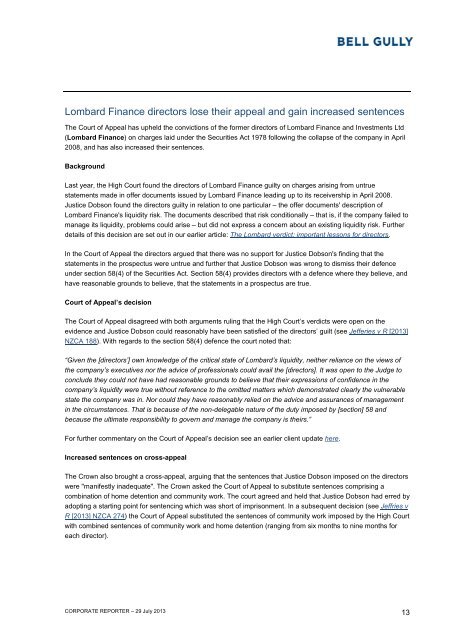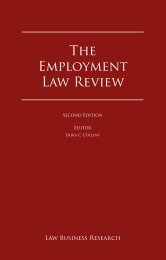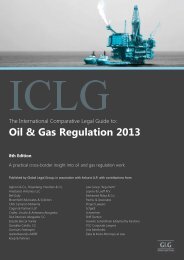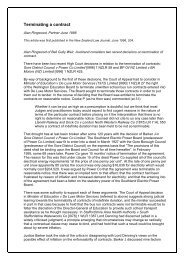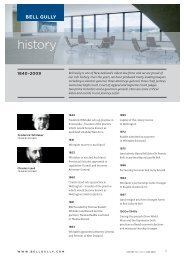Download print version - Bell Gully
Download print version - Bell Gully
Download print version - Bell Gully
- No tags were found...
Create successful ePaper yourself
Turn your PDF publications into a flip-book with our unique Google optimized e-Paper software.
Lombard Finance directors lose their appeal and gain increased sentences<br />
The Court of Appeal has upheld the convictions of the former directors of Lombard Finance and Investments Ltd<br />
(Lombard Finance) on charges laid under the Securities Act 1978 following the collapse of the company in April<br />
2008, and has also increased their sentences.<br />
Background<br />
Last year, the High Court found the directors of Lombard Finance guilty on charges arising from untrue<br />
statements made in offer documents issued by Lombard Finance leading up to its receivership in April 2008.<br />
Justice Dobson found the directors guilty in relation to one particular – the offer documents' description of<br />
Lombard Finance's liquidity risk. The documents described that risk conditionally – that is, if the company failed to<br />
manage its liquidity, problems could arise – but did not express a concern about an existing liquidity risk. Further<br />
details of this decision are set out in our earlier article: The Lombard verdict: important lessons for directors.<br />
In the Court of Appeal the directors argued that there was no support for Justice Dobson's finding that the<br />
statements in the prospectus were untrue and further that Justice Dobson was wrong to dismiss their defence<br />
under section 58(4) of the Securities Act. Section 58(4) provides directors with a defence where they believe, and<br />
have reasonable grounds to believe, that the statements in a prospectus are true.<br />
Court of Appeal’s decision<br />
The Court of Appeal disagreed with both arguments ruling that the High Court’s verdicts were open on the<br />
evidence and Justice Dobson could reasonably have been satisfied of the directors’ guilt (see Jefferies v R [2013]<br />
NZCA 188). With regards to the section 58(4) defence the court noted that:<br />
“Given the [directors’] own knowledge of the critical state of Lombard’s liquidity, neither reliance on the views of<br />
the company’s executives nor the advice of professionals could avail the [directors]. It was open to the Judge to<br />
conclude they could not have had reasonable grounds to believe that their expressions of confidence in the<br />
company’s liquidity were true without reference to the omitted matters which demonstrated clearly the vulnerable<br />
state the company was in. Nor could they have reasonably relied on the advice and assurances of management<br />
in the circumstances. That is because of the non-delegable nature of the duty imposed by [section] 58 and<br />
because the ultimate responsibility to govern and manage the company is theirs.”<br />
For further commentary on the Court of Appeal’s decision see an earlier client update here.<br />
Increased sentences on cross-appeal<br />
The Crown also brought a cross-appeal, arguing that the sentences that Justice Dobson imposed on the directors<br />
were "manifestly inadequate". The Crown asked the Court of Appeal to substitute sentences comprising a<br />
combination of home detention and community work. The court agreed and held that Justice Dobson had erred by<br />
adopting a starting point for sentencing which was short of imprisonment. In a subsequent decision (see Jeffries v<br />
R [2013] NZCA 274) the Court of Appeal substituted the sentences of community work imposed by the High Court<br />
with combined sentences of community work and home detention (ranging from six months to nine months for<br />
each director).<br />
CORPORATE REPORTER – 29 July 2013 13


